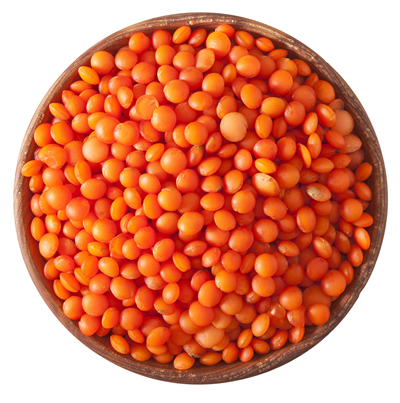Lentils

Compared to other types of dried beans, lentils are relatively quick and easy to prepare. They readily absorb a variety of wonderful flavors from other foods and seasonings, are high in nutritional value and are available throughout the year.
Lentils are legumes along with other types of beans. They grow in pods that contain either one or two lentil seeds that are round, oval or heart-shaped disks and are oftentimes smaller than the tip of a pencil eraser. They may be sold whole or split into halves with the brown and green varieties being the best at retaining their shape after cooking.
Uses
Lentils are used in soups, stews and the Indian dish known as dal. Lentils eaten with rice are a common meat substitute in India, as they contain high amounts of protein as well as iron, phosphorus, calcium and vitamins A and B. The French, on the other hand, like to pair lentils with smoked pork sausage or bacon lardons.
Benefits of Lentiles
Lentils are low in calories and high in nutrition. Eating them at least once a week is a great way to add the health benefits of these tasty legumes to your diet.
Heart Health
Studies have found that people who eat high fiber legumes like lentils have a much reduced risk of heart disease. The high levels of folate and magnesium in lentils also go a long way in protecting the heart.
Stabilize Blood Sugar
Due to their high fiber content, lentils help in regulating blood sugar by providing steady, slow-burning energy and balancing blood sugar levels.
High in Iron
Lentils are loaded with iron and are a great way to replenish the body’s iron stores, especially for people who don’t eat red meat like vegans and vegetarians.
B Vitamins
Lentils are a great source of B vitamins, most notably folate and niacin (B3). B vitamins are important for the healthy functioning of the nervous, digestive, and immune systems.
Lower Cholesterol
Lentils are a great cholesterol lowering food due to their high levels of fiber.
Protein Packed
Protein makes up 26% of the calories in lentils and they have the third highest level of protein than any other plant food. It’s no wonder that they’re a staple in many parts of the world.
Nutritional Information
A lentil has a great source of B vitamins, niacin vitamin B3, folate, iron, magnesium, phosphorus, potassium and vitamin C.
One important vitamin lentil is deficient in is vitamin B12, which is found in dairy products and meat. If you don’t consume either of these food groups, then you would be better off taking it in supplement form.
